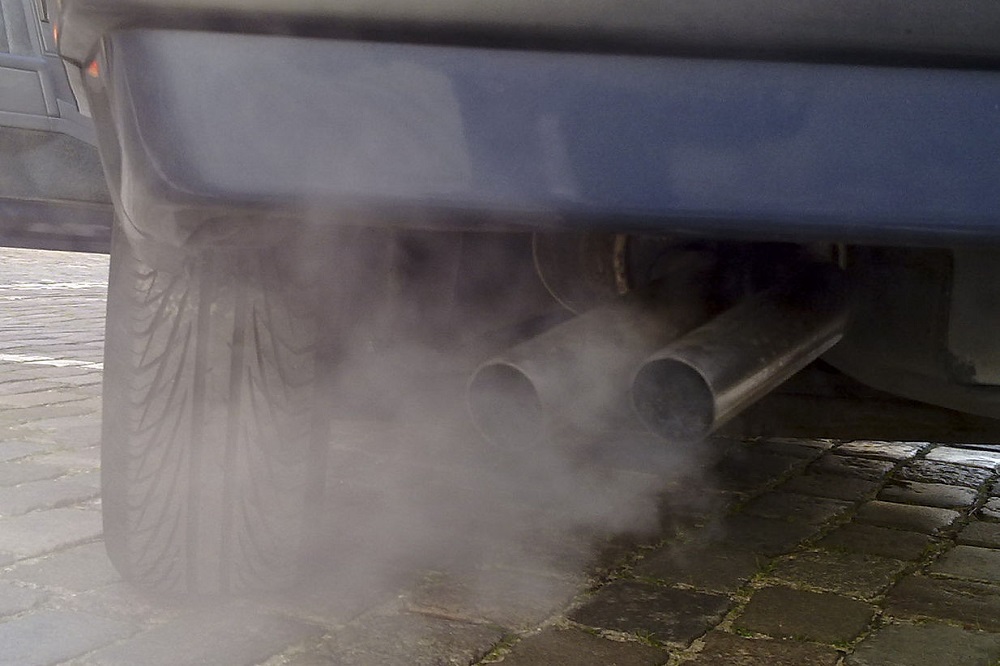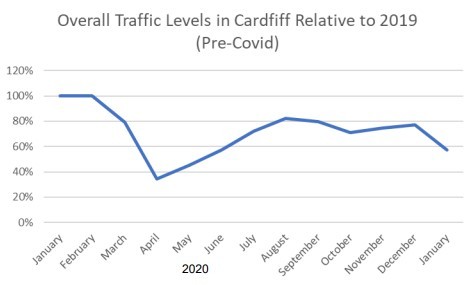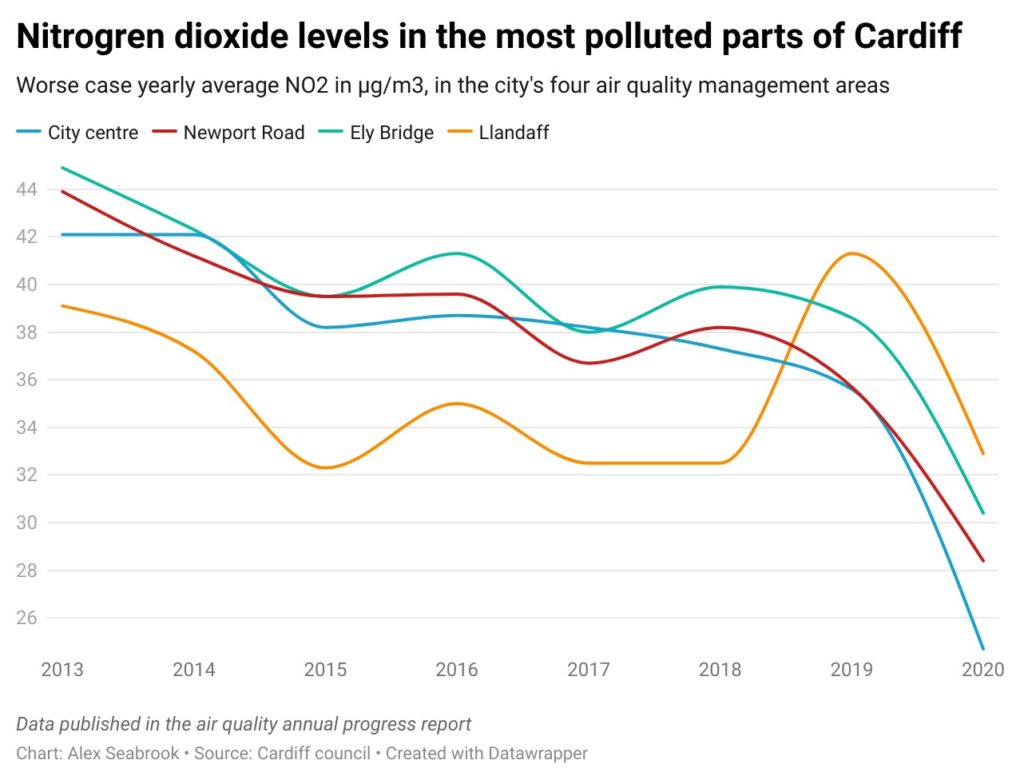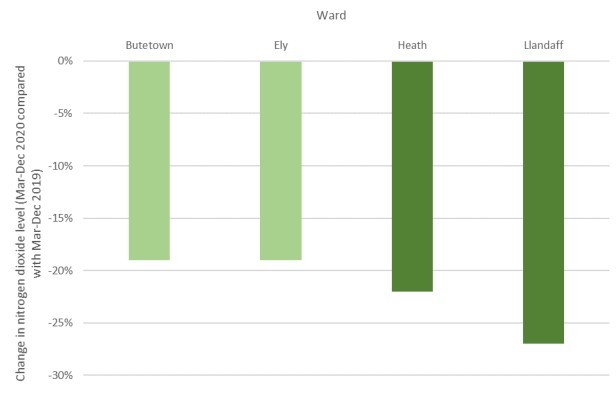How lockdowns improved air quality in some of the most polluted parts of Cardiff

Alex Seabrook, local democracy reporter
New data reveals exactly how much lockdowns improved air quality in some of the most polluted parts of Cardiff.
Last year saw traffic across Cardiff drop by 28 per cent compared to 2019, and by 38 per cent in the city centre.
Fewer people driving due to lockdowns, working from home and the shops being shut, meant much less harmful air pollutants being emitted.

While traffic levels are now increasing again, Cardiff council has major plans to keep air pollution levels falling, and is investing in a huge upgrade of 50 new air quality monitors.
Scientists have shown that people exposed to air pollution have a shorter life expectancy and a higher chance of dying from heart disease, strokes, respiratory diseases and lung cancer. Most air pollution in Cardiff comes from traffic, particularly people driving diesel cars. Detailed data exploring air pollution levels in Cardiff last year was revealed this week in the council’s air quality annual progress report.
Ambitious plans to keep pollution levels down were also revealed in an environmental scrutiny committee meeting on Thursday, November 11, including new electric buses, charging points in lampposts, and a new cycling strategy.
Cardiff has four ‘air quality management areas’ where air pollution is especially high—St Mary Street and Westgate Street in the city centre, Ely Bridge, Stephenson Court on Newport Road, and along Cardiff Road in Llandaff.
Comparing these specific areas in 2019 to 2020, nitrogen dioxide dropped by 31 per cent in the city centre, 20 per cent on Newport Road, 21 per cent on Ely Bridge, and 20 per cent in Llandaff.

Looking at whole wards, comparing from March to December last year with the previous year, nitrogen dioxide dropped by 27 per cent in Llandaff, 22 per cent in the Heath, and 19 per cent in Ely and Butetown.

This drop in air pollution is likely linked to fewer people driving to work and shops, and more people walking and cycling. Richer areas saw larger reductions, probably due to more people being able to work from home than in more deprived areas.
‘Rise again’
While some people continue to work from home, traffic levels have begun to rise again after lockdown restrictions were lifted in Wales. The council now faces several issues in preventing air pollution levels from also rising.
One issue is Castle Street reopening to private traffic. The main road was closed in summer last year, then opened to only public transport and taxis last November.
Pollution experts at the council are monitoring the impact of its reopening on air quality on Castle Street and nearby residential areas like Grangetown and Riverside—which were thought to be negatively impacted by the closure from drivers using alternative routes. The data will be reviewed after three months of the road being reopened.
Another issue is buses. Cardiff Bus recently received the first of 36 new electric buses, which are due to be deployed on the city’s streets early next year.
The buses will be charged overnight at the Sloper Road depot, and tests suggest overnight charging should be sufficient for the buses to last throughout the day. Cardiff Bus is also retrofitting 20 of its diesel buses, and Stagecoach is retrofitting 29, reducing nitrous oxide emissions.
A third issue is charging electric cars. Cardiff is expected to need 10,000 charging points by 2025, and 40,000 by 2030. But the current question is where to put all of these new charging points, particularly on streets with terraced houses and no driveways like in Adamsdown.
The council is planning a pilot of installing charging points in lampposts, with dedicated parking areas reserved for electric cars by the charging points. But technology is developing rapidly—one key example is a new suitcase-sized portable charger called ZipCharge Go.
‘Vandalism’
One “major issue” is security for cyclists. Nextbike recently announced it was temporarily removing all of its bicycles due to staggering levels of vandalism.
The council’s air quality annual progress report, however, praised the scheme as “positively received by members of the public”, and “the UK’s most successful”.
Also, a trial announced more than a year ago—to provide secure cycle storage hangars on residential streets—has now been mothballed.
New security measures, however, could potentially be announced in February in the council’s upcoming new five-year cycling strategy.
But at the moment measuring the effects of these issues, and the impact of any actions is difficult to do in detail. Last year the council only had four automatic air quality monitors, although this could soon be massively expanded with a network of 50 new automatic monitors across Cardiff, costing £65,000.
The council also has 92 non-automatic monitors, called diffusion tubes, but these only collect data monthly and must be manually checked.
A new network of city-wide automatic monitors would allow for data to be collected continuously, potentially uploaded to a publicly available website or app.
This could help research, develop policy, analyse health impacts, and public understanding of air quality. Andrew Gregory, the council’s director of planning, transport and environment, told the environmental scrutiny committee that “each year air quality is becoming more important.
Establishing a real-time monitoring system across the city is a major step.” It’s not yet clear where the new 50 monitors would be, but likely where the risk of harmful pollution is highest.
Support our Nation today
For the price of a cup of coffee a month you can help us create an independent, not-for-profit, national news service for the people of Wales, by the people of Wales.





